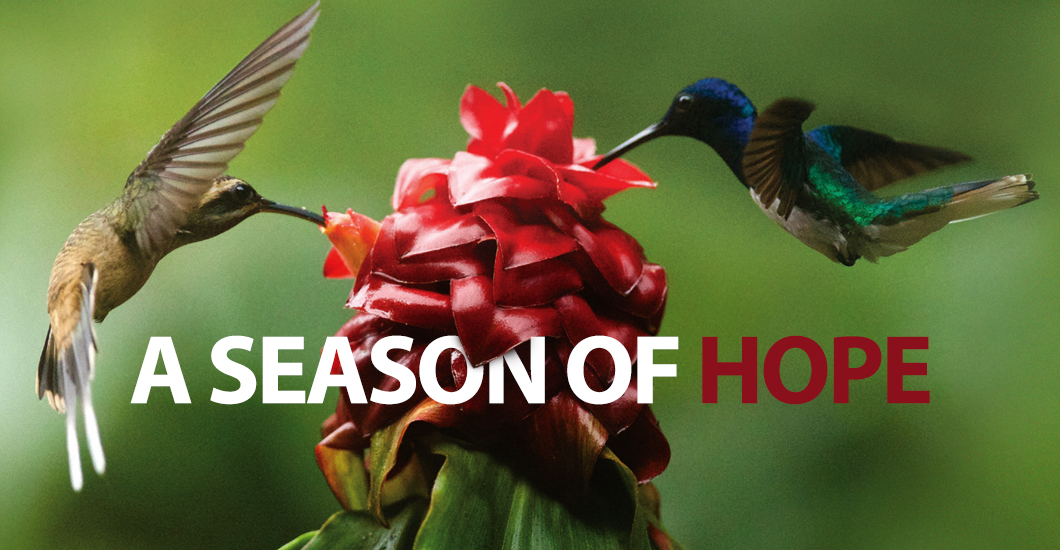Trending Articles
A Season of Hope
What has now been coined “Black Friday” usually marks the official beginning of the season called “Christmas Shopping.” This year I began getting online shopping notices a few days before Thanksgiving, then discovered that Black Friday was followed by Small Business Saturday and Cyber Monday. For many of us, I am afraid the weeks before Christmas are reduced to parties and hectic shopping.
It does not have to be that way. It should not be that way. In my family we have taken a different approach—we have rediscovered the season of Advent. The final weeks of ordinary time leading up to the Feast of Christ the King and the beginning of the Church’s New Year in the season of Advent can be a time of spiritual renewal. The readings and symbols of the liturgy point us toward those last things, those things of ultimate and eternal significance. It is the season where our prayer is, “Come, Lord Jesus. As You came in history, so come more fully into my life now and prepare for when You will come again at the end—at the end of my life—at the end of history.”
Hope: A Theological Virtue
Meditating on the coming of Christ should stir up hope within us. I am not thinking so much of the hope that is simply wishful thinking: I hope I do well on that test. I hope it does not rain on my fishing trip. I hope my sick mother gets better. I hope I get an iPhone for Christmas. No, the hope we are invited to grow in during Advent is the theological virtue of hope. The “Catechism of the Catholic Church” defines hope this way:
“Hope is the theological virtue by which we desire and await from God eternal life as our happiness, placing our trust in Christ’s promises and relying on the help of the grace of the Holy Spirit to merit it and to persevere to the end of our earthly life.”
Hope is a virtue, which means it is a habit or disposition. It is the habit of trusting in God and having confidence in God and His promises no matter what we see with our physical sight. As a theological virtue it concerns our relationship with God. Our relationship with God is founded in, lived in and expressed in hope. We relate to God in hope. Why? Because we cannot see God. We cannot see eternal life and we do not YET experience the fulfillment and happiness that awaits us with God.
Saint Paul says, “Though we do not see Him, we believe in Him, we trust in Him, and we are confident— hopeful—that He will guard what we have entrusted to Him until that day.”
Longing for Fulfillment
Christian hope concerns our longing for and expectation of fulfillment. We can all relate to the experience of feeling unfulfilled. In our personal lives we are not the people we hope to be. We wish we were more patient, more disciplined, more pure, more self-controlled, more disciplined, more faithful, more generous and more bold and courageous. In our relationships we long for more. We experience disappointment in our relationships, we feel let down, we wish there was there more unity, less strife. We wish our relationships were more selfless, less competitive. We long to be known completely and loved unconditionally.
Hope is the steadfast turning toward our true fulfillment, which is supernatural happiness in God. “Our hearts are restless until they rest in thee.” If we set our hope on anyone or anything other than God—even the best things in life, i.e., family, marriage, friendship—we will be disappointed, unsatisfied and unfulfilled. We will never in this life, on this side of death, on this side of heaven, find the fulfillment for which we long. This is why we need hope. If we understand that only in union with God will we find the happiness and fulfillment for which we were made and that we long for, we will pray ever more earnestly in this advent season: “Maranantha, Come Lord Jesus.”
Gordy DeMarais founded Saint Paul’s Outreach on the campus of the University of Saint Thomas in Minnesota and serves as SPO’s current President. Gordy and his wife Teresa have six children, three of whom are full time missionaries with Saint Paul’s Outreach (Peter, Anna, and Catherine), and three grandchildren. They live in Inver Grove Heights, MN and are parishioners at St. Peter’s in Mendota.
Latest Articles
Want to be in the loop?
Get the latest updates from Tidings!





